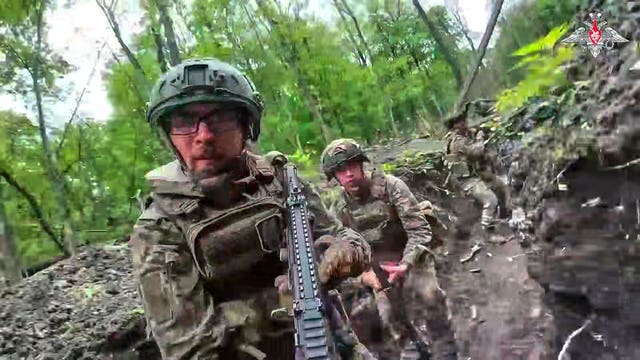Trump hopes for Ukraine ceasefire progress in calls with Putin and Zelensky
The US leader is looking toward a ‘productive’ day as he seeks to end the war.

US President Donald Trump is hoping separate phone calls with Russian leader Vladimir Putin and Ukrainian President Volodymyr Zelensky will make progress toward a ceasefire in the war in Ukraine.
Mr Trump expressed his hopes for a “productive day” on Monday – and a ceasefire – in a social media posts over the weekend. His effort will also include calls to Nato leaders.
The US leader has struggled to end a war that began with Russia’s invasion in February 2022, and that makes these conversations a serious test of his reputation as a dealmaker after having claimed he would quickly settle the conflict once he was back in the White House, if not even before he took office.
The Republican President is banking on the idea that his force of personality and personal history with Mr Putin will be enough to break any impasse over a pause in the fighting.

“His sensibilities are that he’s got to get on the phone with President Putin, and that is going to clear up some of the logjam and get us to the place that we need to get to,” said Mr Trump’s envoy, Steve Witkoff.
“I think it’s going to be a very successful call.”
Mr Trump was said to be “frustrated” by both Russia and Ukraine ahead of the calls.
“He’s grown weary and frustrated with both sides of the conflict,” White House press secretary Karoline Leavitt told reporters on Monday morning. “He has made it clear to both sides that he wants to see a peaceful resolution and ceasefire as soon as possible.”
And Vice President JD Vance said the US is open to walking away from trying to negotiate a ceasefire.
“I’d say we’re more than open to walking away,” Mr Vance told reporters before leaving Rome after meeting with Pope Leo XIV.
Mr Vance said Mr Trump has been clear that the US “is not going to spin its wheels here. We want to see outcomes”.
“We’re going to try to end it, but if we can end it, we’re eventually going to say, you know what? That was worth a try, but we’re not doing it any more.”
Still, there are fears that Mr Trump has an affinity for Mr Putin that could put Ukraine at a disadvantage with any agreements engineered by the US government.
Bridget Brink said she resigned last month as the US ambassador to Ukraine “because the policy since the beginning of the administration was to put pressure on the victim, Ukraine, rather than on the aggressor, Russia”.
Ms Brink said the sign that she needed to depart was an Oval Office meeting in February where Mr Trump and his team openly berated Mr Zelensky for not being sufficiently deferential to them.
“I believe that peace at any price is not peace at all,” Ms Brink said. “It’s appeasement, and as we know from history, appeasement only leads to more war.”
Mr Trump’s frustration about the war had been building before his post on Saturday on Truth Social about the coming calls, which began first with Mr Putin at 10am on Monday (3pm BST).
He said his discussion with Mr Putin would focus on stopping the “bloodbath” of the war.

It also will cover trade, a sign that Mr Trump might be seeking to use financial incentives to broker some kind of agreement after Russia’s invasion led to severe sanctions by the United States and its allies that have steadily eroded Moscow’s ability to grow.
Mr Trump’s hope, according to the post, is that “a war that should have never happened will end”.
His treasury secretary, Scott Bessent, said on Sunday on NBC’s “Meet the Press” that Mr Trump had made it clear that a failure by Mr Putin to negotiate “in good faith” could lead to additional sanctions against Russia.
Mr Bessent suggested the sanctions that began during the administration of Democratic president Joe Biden were inadequate because they did not stop Russia’s oil revenues, due to concerns that doing so would increase US prices.
The United States sought to cap Russia’s oil revenues while preserving the country’s petroleum exports to limit the damage from the inflation that the war produced.
Mr Putin recently rejected an offer by Mr Zelensky to meet in-person in Turkey as an alternative to a 30-day ceasefire urged by Ukraine and its Western allies, including Washington.
Those talks ended on Friday after less than two hours, without a ceasefire in place. However, both countries committed to exchange 1,000 prisoners of war each, with Ukraine’s intelligence chief, Kyrylo Budanov, saying on Ukrainian television on Saturday that the exchanges could happen as early as this week.





